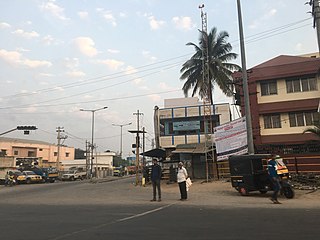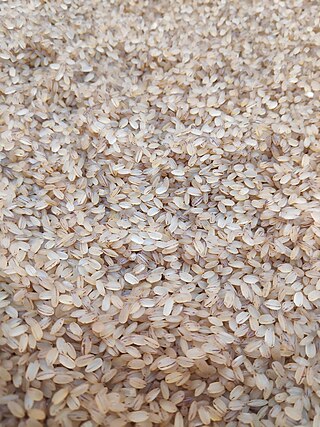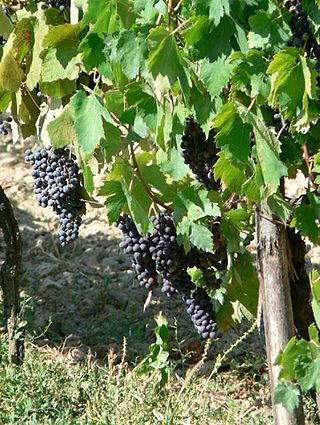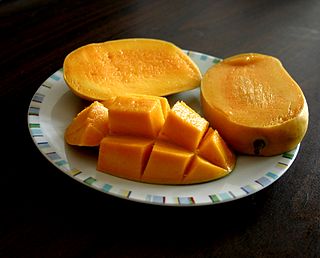Bangalore rose onion, locally called gulabi eerulli, is a variety of onion grown in and around Bangalore in Karnataka. It received the Geographical Indication tag in 2015. [1]
Contents

Bangalore rose onion, locally called gulabi eerulli, is a variety of onion grown in and around Bangalore in Karnataka. It received the Geographical Indication tag in 2015. [1]

Bangalore rose onions are grown in the districts of Bangalore Urban, Bangalore Rural, Chikkaballapur and Kolar. [1] They were also grown in Tumkur, Hassan, Davanagere, Dharwad and Bagalkot. Bangalore rose onions are not cultivated in any other place in India. [2]
The onions of this variety have bulbs with flat base and are spherical. The other characteristics which make them unique are their deep scarlet red colour, anthocyanin, phenols and high pungency. They are also known to contain higher levels of protein, phosphorus, iron and carotene. [1]
The ideal conditions for growing rose onion are: soil with pH between 6.5 and 7, atmospheric humidity of 70 to 75% and average temperature of 25 °C to 30 °C. As these conditions are found around the Bangalore region, the variety is grown exclusively there. [1]
Bangalore rose onions are rarely used in India, but exported in large quantities to other countries such as Malaysia, Singapore, Indonesia, Bahrain, UAE, Bangladesh and Sri Lanka. [3] [4]
During the financial year of 2010–11, over 22,000 tonnes of Bangalore rose onion were exported to other countries. This was lower compared to more than 36,000 and 32,000 tonnes exported in 2003–04 and 2005–06 respectively. More than ₹500 crore worth of rose onion was exported in five years after an Agri Export Zone (AEZ) was set up for the crop in Karnataka. [5] [2]
The Bangalore rose onion was granted the Geographical Indication status in 2015. This allowed the Bangalore Rose Onion Growers' Association headquartered in Chikkaballapur to get patent rights to cultivation of the variety. [3]

Channapatana is a city and taluk headquarters in Ramanagara District, Karnataka, India. Channapatna is approximately 60 km from Bangalore and 80 km from Mysore. The Kannadiga film actor Kishore was born here in 1974. Actress B.Sarojadevi was also born in the place. Former Kabaddi player B.C.Ramesh was born in Byrapatna villages of Channapatna Taluk.
Lasalgaon is a census town in Nashik District in the Indian state of Maharashtra.

Byadagi chilli is a variety of chilli mainly grown in the Indian state of Karnataka. It is named after the town of Byadgi which is located in the Haveri district of Karnataka. It is sometimes written as Bedgi in some supermarkets and grocery stores in India. The business involving Byadagi chillis has the second-largest turnover among all chilli varieties of India. An oil, oleoresin, extracted from these chillies is used in the preparation of nail polish and lipstick. Byadagi chilli is also known for its deep red colour; it is less spicy and is used in many food preparations of South India. Byadagi chilli has been accorded Geographical Indication (GI) in February 2011. Its GI tag is 129.
Mysore Sandal Soap is a brand of soap manufactured by the Karnataka Soaps and Detergents Limited (KSDL), a company owned by the government of Karnataka in India. This soap has been manufactured since 1916, when Krishna Raja Wadiyar IV, the king of Mysore, set up the Government Soap Factory in Bangalore. The main motivation for setting up the factory was the excessive sandalwood reserves that the Mysore Kingdom had, which could not be exported to Europe because of the First World War. In 1980, KSDL was incorporated as a company by merging the Government Soap Factory with the sandalwood oil factories at Shimoga and Mysore. Mysore Sandal Soap is the only soap in the world made from 100% pure sandalwood oil. KSDL owns a proprietary geographical indication tag on the soap, which gives it intellectual property rights to use the brand name, to ensure quality, and to prevent piracy and unauthorised use by other manufacturers. In 2006, Mahendra Singh Dhoni, the Indian cricketer was selected as the first brand ambassador of the Mysore Sandal Soap.

Banganapalle mangoes is a mango variety produced in Banganapalle of Nandyal District in the Indian state of Andhra Pradesh. It alone occupies 70% percent of total mango cultivable area of the state and was first introduced by the farmers of Banaganapalli. It was registered as one of the geographical indication from Andhra Pradesh on 3 May 2017, under horticultural products by Geographical Indication Registry. It is also grown in the other parts of India and Pakistan. The fruit is described as obliquely oval in shape, around 20cm in length, with yellow flesh and a thin, smooth yellow skin. The flesh is of a firm, meaty texture and is sweet and lacks fibre. The cultivar is the most sought after in Andhra Pradesh. It is a very late-season variety that is good for canning. This cultivar is a source of vitamin A & C and is also called king of Mangoes.

Matta rice is an indigenous variety of rice grown in Udupi and Dakshina Kannada districts of Karnataka, Palakkad district of Kerala, India and in Jaffna district of Northern Province, Sri Lanka. It is known for its coarseness and health benefits. It is popular in Kerala and coastal Karnataka in India and Sri Lanka where it is used on a regular basis for idlies, appams and plain rice.

Kolhapuri chappals are Indian decorative hand-crafted and braided leather slippers that are locally tanned using vegetable dyes. Kolhapuri Chappals or Kolhapuris as they are commonly referred to are a style of open-toed, T-strap sandal, but also braided leather Mules or braided leather shoe type designs are also common.
Alibag taluka is a taluka in Raigad district of the Indian state of Maharashtra.

Bangalore blue grape, also simply called Bangalore Blue, is a variety of fox grape grown in districts around Bangalore in India. It is one of the three major varieties of grape in the state of Karnataka. It received a geographical indication tag from the Government of India in 2013.

Mattu gulla, or Udupi gulla, is a variety of green brinjal grown in and around the village of Mattu in Udupi, India. It was given the Geographical Indication tag in 2011.

Coorg orange, also called Coorg mandarin, is a cultivar of orange from Kodagu in Karnataka. It was given the Geographical Indication status in 2006.

Kangra tea is a tea from the Kangra district in Himachal Pradesh, India. Both black tea and green tea have been produced in the Kangra Valley since the mid-19th century. Kangra tea was given the Geographical Indication status in 2005.

Mysore Agarbathi is a variety of incense sticks manufactured at Mysore using locally grown ingredients which was found only in state of Karnataka. This incense has been awarded a Geographical Indication tag from the Government of India in 2005, due to its historic background and remote availability of material used.

The Nanjangud banana is a variety of banana from Nanjangud, Mysore district, Karnataka. This fruit has a unique taste and aroma, and is locally popular. It has been given Geographical Indication Tag Number 29, which helps protect and promote the unique identity of the banana.

Mahabaleshwar strawberry is a strawberry grown in the hilly slopes of Mahabaleshwar, which accounts for about 85 percent of the total strawberry produced in India. Strawberry, along with raspberry, mulberry and gooseberry, is produced on a large scale in and around Mahabaleshwar. Mahabaleshwar strawberry obtained the geographical indication (GI) tag in 2010.

The 'Gir Kesar' mango, also called Kesar, is a mango cultivar grown in the foothills of Girnar in Gujarat, western India. The mango is known for its bright orange colored pulp and was given the geographical indication status in 2011. The biggest market of Gir Kesar is in Talala Gir known as a Mango Market Yard.
The 'Kari Ishad' mango, is a mango cultivar primarily grown in Ankola and Karwar talukas of Uttara Kannada district, Karnataka, India.
The 'Appemidi' mango, is a mango cultivar primarily grown in Malenadu region of Karnataka, India. Appe midi is the variation of the same name. Appemidi varieties include Ananta Bhattana, Kanchappa, and Karnakundala.
Lasalgaon onion is a variety of red onion grown in the Indian state of Maharashtra. It is a common and widely cultivated crop in Lasalgaon located in the Niphad taluka of the Nashik district. Lasalgaon has the largest onion market in India and the Asian continent. Significantly, the Lasalgaon onion market rate serves as a benchmark, influencing onion prices across the Asian market.
Alibag White onion is a traditional variety of white onion grown in the Indian state of Maharashtra. It is a common and widely cultivated crop in the Alibag taluka of the Raigad district. This unique onion is characterized by its sweetness, low pungency, and high nutritional value. It is traditionally cultivated in Alibag, specifically in villages such as Karle, Khandala, Nevuli, Talvali, Sagaon, and Wadgaon. It has been recognized since 1883 in the official gazette and known for its medicinal properties, for its health benefits, including treating heart ailments, controlling cholesterol, and regulating insulin.